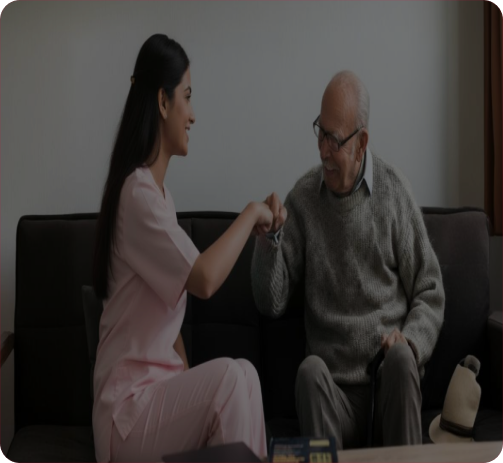As we age, mental health needs change and become complicated and individualistic. In all this hustle and bustle, however, our elderly loved ones may have the issues swept under the rug. Indeed, it is a sobering reality and one that creates an important question: Are we providing adequate care for their mental health?
Elders of today face challenges that can have deep effects on their emotional well-being. Depression, for example, often arises during significant transitions in life, such as retirement or the loss of a loved one. Anxiety also creeps into their lives, often caused by health concerns or financial worries. Cognitive conditions like dementia and Alzheimer's add complexity to their journey. Perhaps the saddest of all is this toll of loneliness, impacting their mental health but likewise having far-reaching effects on their physiological lives.
These challenges remind us that elderly care is not only about physical health but also about mental health. Thanks to the programs designed with their needs in mind, they are now becoming a source of hope, care, and connection.
Understanding the Challenges
Mental health issues in old age tend to get strongly interwoven with their physical and social well-being. This is what makes them a bit complicated. Depression is one of the most common issues, often arising from the emotional strain of significant life changes. Anxiety, too, is a frequent companion, rooted in uncertainties about health and finances.
Cognitive changes add another layer of difficulty. While natural aging may bring slower processing speeds or occasional memory lapses, more severe conditions like dementia significantly impact an elder’s mental health and sense of identity.
And then, there’s the quiet ache of loneliness. Social isolation can be emotionally taxing, but its effects don’t stop there—it can also contribute to cognitive decline, depression, and physical ailments such as hypertension.
Acknowledging these challenges is the first step to crafting effective mental health programs that truly empower older adults and restore their sense of dignity and purpose.
The Promise of Specialized Mental Health Programs
Specialized mental health programs tailored for elders provide much more than just care; they bring a renewed sense of hope and well-being. Unlike generic solutions, these programs are designed to meet the unique emotional and physical needs of older adults.
Such programs consider the challenges of aging, whether it’s coping with chronic conditions, navigating grief, or managing physical limitations. The result is care that feels personalized and empowering.
Beyond the individual benefits, these programs also strengthen family bonds by equipping caregivers with education and support. When caregivers feel confident and understood, they can create a nurturing environment where elders thrive.
These tailored solutions not only enhance the quality of life for elders but also reduce healthcare costs by preventing hospital visits and managing conditions proactively. It’s a win-win for families and the healthcare system.
Creating Meaningful Care: What Makes These Programs Effective
For a mental health program to be effective, it needs to be holistic. It will only work if the true needs of each person being cared for are known in detail. Comprehensive assessments, including both cognitive testing and mood evaluation, provide the foundation from which to build individualized care plans.
The collaborative effort of a multidisciplinary team, such as psychiatrists, therapists, and social workers, ensures that every aspect of an elder's mental health is addressed. Activities such as cognitive exercises, memory workshops, and art therapy provide stimulation, joy, and a sense of purpose.
Social engagement activities are equally significant. Group activities and interaction with different generations help foster a sense of community and help alleviate isolation that is suffered by so many older adults.
Innovative Therapies in Mental Health Programs
Today's mental health programs are infused with innovative therapies that go beyond traditional care methods. Reminiscence therapy, for instance, allows elders to reflect on cherished memories, emotional healing, and a renewed sense of identity. Art and music therapy provide creative outlets for expression, soothing the mind and spirit.
Such forms of therapy, such as horticultural therapy, with roots well in the earth, promote emotional well-being and feelings of accomplishment. Pet therapy comfort also fills the loneliness gap. A growing role is also coming from technology, such as apps and virtual reality solutions, which make mental health assistance more accessible and interesting to people.
Breaking Barriers to Mental Health Care
Despite the remarkable progress in senior mental health care, barriers remain. Stigma continues to discourage many elders from seeking help, a challenge we must address through open conversations and awareness campaigns.
Accessibility is another hurdle. By offering telehealth services and home-based care, we can make mental health support easier to reach. Healthcare providers, too, need specialized training in geriatric care to ensure that elders receive the understanding and expertise they deserve.
Integrating mental health services into primary care can further streamline access, removing the stigma and making it a natural part of overall well-being.
The mental health of our elderly loved ones deserves our utmost attention. Tailored programs are proving to be a lifeline, enabling older adults to navigate their later years with grace, dignity, and joy. From reminiscence therapy to holistic care models, these programs offer solutions that are both compassionate and effective.
As society continues to age, prioritizing mental health isn’t just an option—it’s a responsibility. Let’s embrace these programs, break down barriers, and build a future where every elder thrives emotionally, mentally, and socially.
It’s time to act. Together, we can ensure that our elders receive the compassionate care they so richly deserve.













